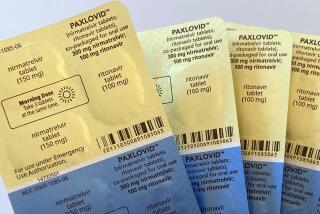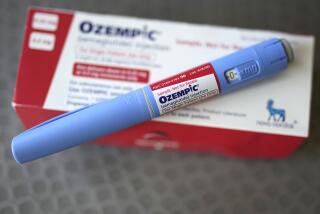Unproven Ebola cures, preventives proliferate
Amid alarm over the Ebola virus, a flurry of pitches has sprung up for products that claim to prevent and treat the deadly infection. Online -- and increasingly on social media sites -- these products are being hawked by paid consultants, supplement gurus and “wellness advocates,” whose claims range from silly to pseudo-scientific.
In at least three cases to date, those pitches have drawn letters from the Food and Drug Administration, warning the companies involved to stop asserting that their products are safe and effective in treatment of Ebola or any other disease.
A late-September letter from the agency to the Utah-based company Young Living warns that its paid consultants have taken to the Internet, as well as to Facebook, Twitter, and Pinterest, to claim that several of the company’s essential oils can treat and ward off Ebola infection (as well as Parkinson’s disease, Alzheimer’s, asthma, autism and cancers of all sorts).
A similar FDA letter went to DoTerra International, another Utah-based company selling essential oils.
In these cases, consultants and “wellness advocates” have touted the curative or preventive powers of melaleuca oil (also known as tea tree oil), cinnamon oil, oregano oil, and a blend of cinnamon, rosemary, clove, eucalyptus, and lemon oils marketed as “Thieves oil” for Ebola.
“If I were exposed to Ebola or had reason to believe I could be sick with it, I would use some of these oils every 10 minutes for a few hours, then cut back to every hour for the rest of the first day,” wrote one consultant for Young Living on the website, under the heading, “Essential Oils & More to Combat Ebola Virus.”
“Then I would use them every 2 waking hours of the day for at least a week, or longer if it was known I was sick,” the writer added.
Elsewhere on the same website, the health advisor wrote, “If Ebola was going around in my area . . . I would apply [Thieves oil] to my feet and armpits 2x/day or more and take it in capsules at least 2x/day for preventive purposes.”
Essential oils have not shown any evidence of effectiveness against viruses, and certainly not against the Ebola virus, said Gerald Weissmann, editor-in-chief of the journal of the Federation of American Societies for Experimental Biology and professor of medicine at New York University.
The low value of such oils in fighting infectious disease is evident in a simple comparison, said Weissman: While American diets are not, on the whole, rich in the use of essential oils, African diets are.
“We don’t have Ebola,” said Weissmann. “They do.”
On Sept. 23, the FDA wrote to the New Jersey-based Natural Solutions Foundation demanding that it stop marketing an anti-viral “personal protection pack” of a nano-silver solution and organic dark chocolate bars. On its website, the company claims that the “nutrient” nano-silver “is unlimited in its effectiveness ... [and is a] safe, nontoxic ... and available solution against Ebola and every other communicable disease.”
Silver has been used for thousands of years to block the growth of microbes: that’s the basis for using silverware to eat. More recently, it’s been woven into socks to reduce odor-causing bacteria and into wound dressings to tamp down infections.
But, says environmental health professor Andrew Maynard, “there’s a massive jump from odor-resistant socks to curing Ebola patients.”
If enough silver comes into contact with a microbe, that microbe will die, said Maynard, who directs the University of Michigan’s risk science center. But with viruses, said Maynard, nothing short of massive amounts of silver -- enough to destroy healthy cells -- would be required to inhibit the replication of a virus.
It could be worse than that, too, said Weissmann. The use of such tiny particles of silver, he said, may help facilitate the entry of a virus into cells.
The marketing of such products as treatment for Ebola does more than mislead U.S. consumers and separate them from their money, says pharmacist Gary Coody, coordinator of the FDA’s health fraud unit. “It’s a global issue,” he says, with internet marketing aimed at people in zones where the ebola virus is much more than a theroetical danger.
“These companies are marketing to U.S. citizens to buy for friends and relatives in Africa,” said Coody in a recent interview. West Africans who get such fraudulent elixirs, Coody added, not only rely on unproven and possibly even dangerous products; they may also abandon protective measures, including disinfectants and isolation from the infected, that have been shown to work.
Companies offering such remedies have increasingly distanced themselves from their sales force -- people who often work as consultants or are paid on commission. Coody said those spokespeople are making increasing use of social media sites to make their claims for the products. Readers who click on the “Buy” button are directed to the manufacturer’s website.
That, said Coody, makes the manufacturer responsible for the health claims made on its behalf.
Not all of these Ebola entrepreneurs are selling products: some are selling books that purport to contain the secrets to fighting Ebola.
In a recent pitch to reporters for his latest book, Dr. Thomas E. Levy wrote that “the key to successfully combating this virus might be something that’s familiar to all of us: vitamin C.” Levy is the author of “Primal Panacea” and “Curing the Incurable: Vitamin C, Infectious Diseases, and Toxins.”
“When I say that vitamin C may help destroy the Ebola virus, I’m talking about regular doses of 50, 100, or even many more grams of various types of vitamin C, administered through a variety of methods (most often, orally and intravenously) by a medical professional,” Levy wrote. “After the initial dose, clinical evaluation is necessary to determine whether future doses, method of administration, and type of vitamin C should be adjusted.”
Vitamin C, said Weissmann, has been billed as the cure for everything from the common cold to aging, and in doses consistent with a healthy diet, it is indisputably important in maintaining health.
But at doses higher than that, “there’s no evidence it has any effect on infectious disease,” said Weissmann. And at excessive doses, Vitamin C supplementation can cause malabsorption of food, which leads to diarrhea. For a patient battling Ebola, he added, that would only worsen the prognosis.
“All this quack stuff take money and effort away” from solid scientific research aimed at finding treatment for such scourges, said Weissmann. But when fear, greed and ignorance collide, he said, fraudulent and even dangerous cures invariably appear.
“It’s very difficult to stop magic belief,” said Weissmann. “No matter how sensible you are, there’s always this hope that maybe this will help.” Sadly, he said, there is no cure available now but isolating the ill.
I like science; superstition, conspiracy and silliness, not so much. Follow me on Twitter at @LATMelissaHealy and “like” Los Angeles Times Science & Health on Facebook.






